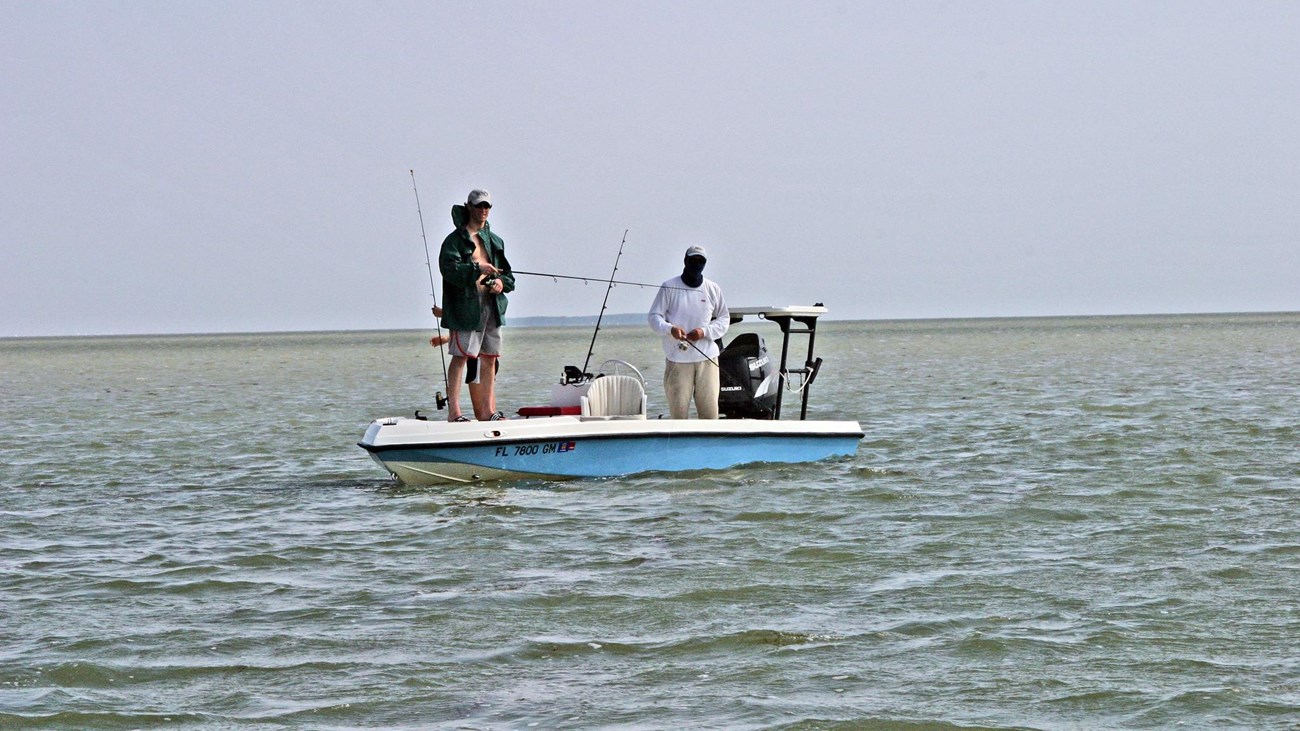Last updated: January 7, 2025
Thing to Do
Fishing in the Everglades

NPS Photo/ R. Cammauf
One third of Everglades National Park is covered by water, creating excellent boating and fishing opportunities!
Snapper, sea trout, redfish, bass, and bluegill are plentiful. Saltwater fishing includes Florida Bay, the Ten Thousand Islands, and elsewhere in the park's coastal zone.
Freshwater and saltwater fishing require separate Florida fishing licenses. Be aware of local fishing information.
If fishing at or north of Nine Mile Pond, a freshwater fishing license is required.
South of Nine Mile Pond, a saltwater fishing license is required
Freshwater Fishing
- License: A Florida freshwater fishing license is required to fish in freshwater or to possess fresh water species.
- Bait: Live or dead fish (including minnows and shiners) or amphibians, and non-preserved fish eggs or roe, are prohibited. Digging for bait inside the park is not permitted.
- Closed to Fishing: No fishing is allowed at the Ernest F. Coe (Main) Visitor Center lakes, Royal Palm Visitor Center area and trails, Chekika Lake, along the first 3 miles of the Main Park Road, including Taylor Slough, or along the Shark Valley Tram Road.
Saltwater Fishing
- License: A Florida saltwater fishing license is required to fish in saltwater or to possess saltwater species.
- Bait: Bait, except for mullet and shrimp, is not included in bag limits. Saltwater bait: shrimp, minnows, pilchards, pinfish, mullet, mojarras (shad), or ballyhoo. Bait may be taken with hook and line, dip net (not wider than 3 feet / 0.9 m), and cast net.
- Closed to Fishing: No fishing is allowed in Eco, Mrazek or Coot Bay Ponds at any time. No fishing is allowed at the Flamingo Marina during daylight hours.
- Manatee Etiquette: Areas frequented by manatees have been posted. Keep an eye out for manatees. Slow to an idle if observed, but do not approach or molest.
- Lobster and Queen Conch: The taking and possession of lobster and queen conch is prohibited.
- Recreational Crabbing: Stone crabs, during open state season, and blue crabs may be taken by recreational fishermen using attended gear (for example: star trap, baited line, landing net, etc.). Crabbers are limited to five (5) traps. Unattended gear, including traps, is prohibited.
- Shrimp: Shrimp may be taken by dip net (not wider than 3 feet / 0.9 m) or cast net, for personal use only, not for sale.
Additional Regulations
- Licensed anglers are limited to possession of 20 fish/person at any time, but may possess no more than 10 fish of any one species.
- Please be aware that the bag limit for many species is less than 10 fish.
- There is no possession limit for non-native species.
- All anglers are reminded to pick up a current copy of the Everglades Fishing Regulations available at all visitor centers and entrance stations.
Mercury Warning
Warning! High levels of mercury have been found in Everglades bass and in some fish species in northern Florida Bay. Do not eat bass caught north of the Main Park Road. Do not eat bass caught south of the Main Park Road more than once a week. Children and pregnant women should not eat any bass. The following salt water species caught in northern Florida Bay should not be consumed more than once per week by adults or once per month by women of child-bearing age and children: spotted seatrout, gafftopsail, catfish, bluefish, crevalle jack, or ladyfish.
Youth under the age of 16 do not need a fishing license, although they must abide by all other fishing regulations such as gear type, bag and size limits. They may, however, be asked to provide proof of age.
A Florida saltwater fishing license is required to fish in saltwater or to possess saltwater species.
Entrance fees may apply, see Fees & Passes information.
Accessible dock and pier fishing in the Flamingo Marina is not allowed during daylight hours.
